The name of the Messiah is Yeshua, a common alternative of the name Yehoshua (יהושע), which means ‘Yah is salvation’ [Matthew 1:21]
Passover has many meanings and all of them point towards the redemption in Yeshua the Messiah.
Together with the Feast of Unleavened Bread and the Feast of First Fruits, Passover is part of the three Spring Festivals of Yahweh. Yeshua fulfilled all three of them. He was the Passover Lamb, he was the unleavened Bread because His life had no sin and He resurrected on the day of First Fruits as the First of many to resurrect with a spiritual body.
The Hebrew word for Passover is «Pesach» [Strong’s H6453 – a pretermission, i.e. exemption]. It comes from «Pacach» [ Strong’s H6452 – to pass over, skip]
Many people wrongly believe that these Feasts are Jewish. They are not the Feasts of the Jews; they are the Feasts of the Eternal [יהוה]
Leviticus 23:1-2 [Brenton's English Septuagint-1851]
1 And the Lord spoke to Moses, saying,
2 Speak to the children of Israel, and thou shalt say unto them, The feasts of the Lord which ye shall call holy assemblies, these are my feasts.
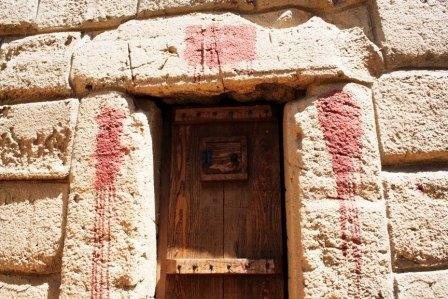
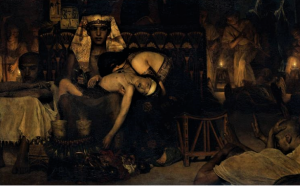
HISTORICAL ASPECT – Exodus chapters 3 to 12
In the book of Exodus we see that Mosheh (Moses) was chosen by the Eternal to free His people, the congregation of Yisrael, from slavery. He sent Mosheh to tell Pharaoh to let His people go to the desert to worship Him.
The Egyptians did not allow the Hebrew people to leave their domain to celebrate the Feast in spite of all the signs that the Eternal gave Pharaoh in the form of plagues. Then the Eternal instructed Mosheh and the Hebrew congregation to perform the Passover sacrifice.
On the 10th of Aviv they were to choose a year old lamb without blemish from the herd, keep it apart and check it for any blemishes. On the evening of the 14th of Aviv it would be killed; its blood would be put on the two door posts and the lintel of the door of each house; that night they were to eat the liberation meal: lamb, unleavened bread and bitter herbs (they were to eat this meal in haste, with their loins girded, shoes on their feet and their staffs in their hands, ready to leave the land that enslaved them and march towards the land of liberty).
Later on that same night, the Eternal would cause the death of all the firstborn of Egypt including animals but would “pass over” the doors that had the blood of the lamb on them and this way the Hebrew firstborn were saved.
This foreshadowed the saving power of the blood of Yeshua.
YESHUA FULFILLED THE PASSOVER COMMAND
A comparison of the Passover command in the book of Exodus and the last week of the life of Yeshua on this earth will show us that He in fact fulfilled every aspect of Passover.
Exodus 12:3 3 “Speak to all the congregation of Yisra’el, saying, ‘On the tenth day of this month each one of them is to take for himself a lamb, according to the house of his father, a lamb for a household. ... 5 ‘Let the lamb be a perfect one, a year old male. 6 And you shall keep it {from the 10th} until the fourteenth day of the same month ... 46 It is eaten in one house, you are not to take any of the flesh outside the house, nor are you to break any bone of it
<Let the lamb be a perfect one>
A perfect lamb means a one without blemishes or imperfections. Yeshua fulfilled this requirement as he committed no sin
Hebrews 4:15 [Moffatt NT] 15 for ours is no high priest who is incapable of sympathizing with our weaknesses, but one who has been tempted in every respect like ourselves, yet without sinning
1 Peter 2:21-22 21 For to this you were called, because Messiah also suffered for us, leaving us an example, that you should follow His steps 22 “who committed no sin, nor was deceit found in His mouth
1 John 3:5
5 And you know that He was manifested to take away our sins, and in Him there is no sin.
1 Peter 1:19 9 but with the precious blood of Messiah, as of a lamb unblemished and spotless
<A year old male>
Obviously Yeshua was not a year old. But if the Passover lamb was a year old it implies that it was sacrificed around the same time of the year when it was born. Lambs are not like humans that can be born anytime of the year. There is a lambing season which, in first century Israel and according to the breeds in existence at that time in Israel, takes place during the months of March and April in other words around the Passover season. Passover lambs were born on or around Passover.
Similarly, if Yeshua is the ‘Lamb of Yahweh’ and he died during the Passover, it follows that He must have been born near or during the Passover time. [See the article ‘A LAMB BORN IN BETHLEHEM’ for more information on the ‘Lamb of Yahweh’].
Yeshua is the Lamb of the Eternal. There are many verses in the Nazarene Writings [so called New Testament] that attest to this. John the Immerser was the first to recognise Him as such
John 1:26-29
26 Yohanan answered them, saying, “I immerse in water, but in your midst stands One whom you do not know,
27 the One coming after me, who has become before me, whose sandal strap I am not worthy to loosen.”
28 This took place in Beyth Anyah beyond the Yarden, where Yohanan was immersing.
Behold, the Lamb of God
29 On the next day Yohanan saw יהושע coming toward him, and said, “See, the Lamb of Elohim who takes away the sin of the world!
He is called a Lamb in other verses as well
Acts 8:32 32 And the passage of the Scripture which he was reading was this, “He was led as a sheep to slaughter, and like a lamb silent before its shearer, so He opened not His mouth.
Foreshadowed in that Passover lamb was the Perfect Lamb of the Eternal without blemish who willed to sacrifice himself for us. Just as the Passover lamb freed the Yisraelites from the Angel of Death, Yeshua freed us from the enslaving power of sin, from the adversary and from the 2nd death in the Lake of Fire (the Eternal Destruction).
<And you shall keep it {from the 10th} until the fourteenth day of the same month>
During the first Passover the children of the Eternal separated a lamb four days before the sacrifice of the lamb observing it for any fault or blemish.
In Yeshua’s day, He entered Jerusalem on the tenth of Nissan (Abib) riding on a colt at the same time and on the same day that the Jews were taking their lambs to the temple to be inspected on the next day by the High Priest and the kohanim (priests).
The Eternal was taking His Lamb to the Temple to be inspected before the Ultimate Sacrifice.
FOUR DAYS OF INSPECTION
According to the Mosaic instructions on the observance of the Passover, the lamb was to be inspected by the High Priest and cohanim for four days before the Passover slaying of the lamb. For four days, Yeshua was also inspected, interrogated, accosted, intimidated, and challenged by the Pharisees, scribes and lawyers.
From the 11th to the 14th of Nisan, the Passover lamb stood in the inner Temple arena and was scrutinized by the High Priest and Sadducees. On these same four days, Yeshua stood in the outer courts of the temple, ministering to the populous and repeatedly responding to the inspecting challenges by the rabbinic masters of law, halakhah, temple authority, and religious dogma, or eventually in the judgement hall of Pilate listening to the slanderous accusations against Him.
[Robert D Mock – biblesearchers.com
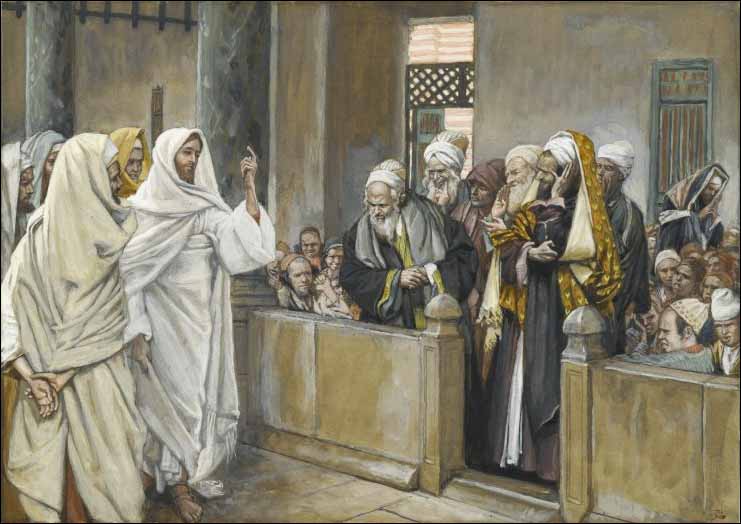
THE CHIEF PRIESTS, THE SCRIBES AND THE ELDERS CHALLENGE YESHUA’S AUTHORITY:
Luke 20:1-8; Matthew 21:23-27; Mark, 11: 27-33 1 And it came to be, on one of those days, as He was teaching the people in the Set-apart Place and bringing the Good News, that the chief priests and the scribes, together with the elders, came up 2 and spoke to Him, saying, “Say to us, by what authority are You doing these{teachings}? Or who is he who gave You this authority?” 3 And He answering, said to them, “I shall ask you one question too, and answer Me: 4 “The immersion of Yohanan {John the Immerser} – was it from heaven or from men?” 5 And they debated among themselves, saying, “If we say, ‘From heaven,’ He shall say, ‘Then why did you not believe him?’ 6 “But if we say, ‘From men,’ all the people shall stone us, for they are persuaded that Yohanan was a prophet.” 7 And they answered that they did not know from where it was. 8 And יהושע said to them, “Neither do I say to you by what authority I do these.” {Yeshua’s words in purple}
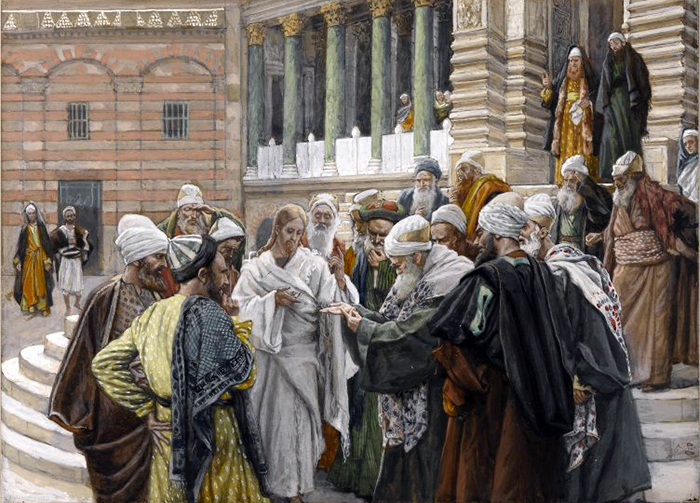
THE PHARISEES AND THE HERODIANS ASK YESHUA ABOUT PAYING TAXES TO CAESAR:
Matthew 22:15-22 - Mark 12:13-17 - Luke 20:20-26 15 Then the Pharisees went and plotted how to trap Him in His words. 16 And they sent to Him their taught ones with the Herodians, saying, “Teacher, we know that You are true, and teach the way of Elohim in truth, and it does not concern You about anyone, for You are not partial to any man. 17 “Then say to us, what do You think? Is it right to pay taxes to Caesar, or not?” 18 But knowing their wickedness, יהושע said, “Why do you try Me, you hypocrites? 19 “Show Me the coin of the tax.” And they brought Him a silver piece. 20 And He said to them, “Whose likeness and inscription is this?” 21 They said to Him, “Caesar’s.” And He said to them, “Then give to Caesar what is Caesar’s, and to Elohim what is Elohim’s.” 22 And having heard, they marvelled, and left Him and went away.

THE SADDUCEES ASK YESHUA ABOUT RESURRECTION:
Matthew 22:23-33 - Mark 12:18-27 - Luke 20:27-38 23 On that day Sadducees, who say there is no resurrection, came to Him and asked Him, 24 saying, “Teacher, Mosheh said that if anyone should die, having no children, his brother shall marry his wife and raise offspring for his brother. 25 “And there were with us seven brothers, and the first died after he had married, and having no children, left his wife to his brother. 26 “In the same way the second also, and the third, unto the seventh. 27 “And last of all the woman died too. 28 “At the resurrection, then, whose wife of the seven shall she be – for all had her?” 29 And יהושע answering, said to them, “You go astray, not knowing the Scriptures nor the power of Elohim. 30 “For in the resurrection they do not marry, nor are they given in marriage, but are as messengers of Elohim in heaven. 31 “And concerning the resurrection of the dead, have you not read what was spoken to you by Elohim, saying, 32 ‘I am the Elohim of Abraham, and the Elohim of Yitshaq, and the Elohim of Yaʽaqob’? Elohim is not the Elohim of the dead, but of the living.” 33 And when the crowds heard, they were astonished at His teaching.
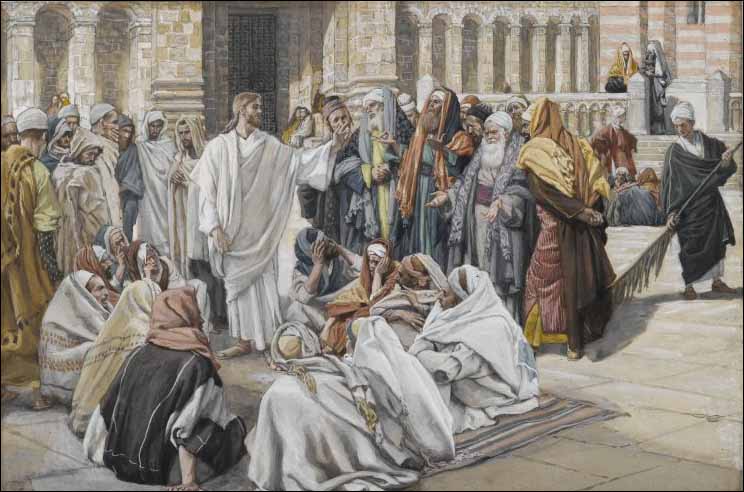
THE SCRIBES ASK YESHUA ABOUT THE GREAT COMMANDMENT:
Mark 12:28-34 - Matthew 2:34-40 - Luke 20:39,40 28 And one of the scribes coming near, hearing them reasoning together, knowing that He had answered them well, asked Him, “Which is the first command of all?” 29 And יהושע answered him, “The first of all the commands is, ‘Hear, O Yisra’el, יהוה our Elohim, יהוה is one. 30 ‘And you shall love יהוה your Elohim with all your heart, and with all your being, and with all your mind, and with all your strength.’ This is the first command. 31 “And the second, like it, is this, ‘You shall love your neighbour as yourself.’ There is no other command greater than these.” 32 And the scribe said to Him, “Well said, Teacher. You have spoken the truth, for there is one Elohim, and there is no other besides Him. 33 “And to love Him with all the heart, and with all the understanding, and with all the being, and with all the strength, and to love one’s neighbour as oneself, is more than all the burnt offerings and offerings.” 34 And when יהושע saw that he answered wisely, He said to him, “You are not far from the reign of Elohim.” And after that no one was bold enough to question Him.
On the evening before He was arrested, 14th of Nissan (Abib), Yeshua had a meal with His disciples. We will study this meal in depth in an upcoming article “DID YESHUA EAT THE PASSOVER MEAL BEFORE HE DIED?”
[For a close look at Yeshua’s death see the article “MESSIAH’S DEATH FORETOLD”]
EASTER THE FALSE PASSOVER
Yeshua’s followers continued to keep the Passover in memory of the Messiah and with the new symbols (Bread and Wine) that he instituted. Slowly, in the years that followed, an anti-Jewish sentiment began to rise within the ‘general congregation’ and some started to move away from ‘Jewish customs’, Passover among them.
Those who were faithful to the instructions of the Scriptures and to Yeshua still kept the Passover on the 14 of Nissan (Abib) in spite of the condemnation of those influenced by Rome. It was in the year 325 after Yeshua that Emperor Constantine convened the Council of Nicea to decide when the Passover should be kept [Even if the Eternal already commanded when to keep it]
…the emperor…convened a council of 318 bishops…in the city of Nicea…They passed certain ecclesiastical canons at the council besides, and at the same time decreed in regard to the Passover that there must be one unanimous concord on the celebration of God’s holy and supremely excellent day. For it was variously observed by people…
(Epiphanius. The Panarion of Epiphanius of Salamis, Books II and III (Sects 47-80), De Fide). Section VI, Verses 1,1 and 1,3. Translated by Frank Williams. EJ Brill, New York, 1994, pp.471-472).
A Sunday date was selected, instead of Nisan 14 which can fall on any day of the week. After the selection of the new Passover Emperor Constantine declared
The commemoration of the most sacred paschal feast being then debated, it was unanimously decided, that it would be well that it should be everywhere celebrated upon the same day. What can be more fair, or more seemly, than that that festival by which we have received the hope of immortality should be carefully celebrated by all, on plain grounds, with the same order and exactitude? It was, in the first place, declared improper to follow the custom of the Jews in the celebration of this holy festival, because, their hands having been stained with crime, the minds of these wretched men are necessarily blinded. By rejecting their custom, we establish and hand down to succeeding ages one which is more reasonable, and which has been observed ever since the day of our Lord’s sufferings. Let us, then, have nothing in common with the Jews, who are our adversaries. For we have received from our Saviour another way…
(Theodoret of Cyrus. Ecclesiastical History (Book I), Chapter IX. Excerpted from Nicene and Post-Nicene Fathers, Second Series, Volume 3. Edited by Philip Schaff and Henry Wace. American Edition, 1892. Online Edition Copyright © 2005 by K. Knight).
According to Eusebius’ Life of Constantine, Book III chapter 18, a more accurate translation of that last line above from the Roman Emperor Constantine should be:
Let us then have nothing in common with the detestable Jewish crowd; for we have received from our Saviour a different way.
Our Master and Saviour Yeshua was from the tribe of Judah and therefore a Jew but He never branded His people as detestable in fact He asked His Father to forgive them for what they did to Him. This New Passover that was declared in the 4th century was known as the Christian Passover or Easter [See the article WHERE DID EASTER COME FROM?]
YESHUA IS OUR PASSOVER
Today, Yeshua’s followers still commemorate Passover not by sacrificing a lamb but using the symbols that He instituted on His last Passover with His disciples.
Luke 22:19
19 And taking bread, giving thanks, He broke it and gave it to them, saying, “This is My body which is given for you, do this in remembrance of Me.”
Yeshua the Messiah is our Passover that offers Himself to the Eternal the Father as a sweet-smelling sacrifice and was slaughtered as a lamb for our sins. The first Passover freed the people of Yahweh from the Egyptian slavery. Our Passover, Yeshua, freed us from the slavery of sin.
1 Corinthians 5:7
7 Therefore cleanse out the old leaven, so that you are a new lump, as you are unleavened. For also Messiah our Passover was offered for us
Sources:
Yhemaelh Zeev – Kajal Yisraelita de Yahshua Shiló; Tom Martincic – eliyah.com; Jonathan Cahn; Yaiy; Richard C. Nickels; Ben T. Ambrose; Bob Thiel
Unless otherwise noted, all Scripture was taken from The Scriptures
Copyright by Institute for Scripture Research.
Used by permission.